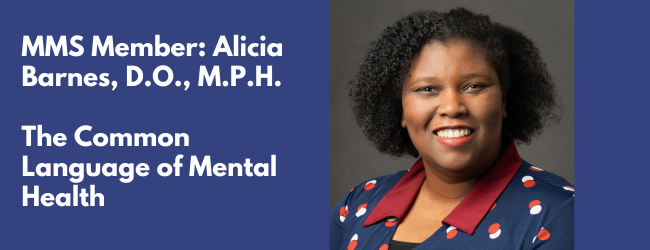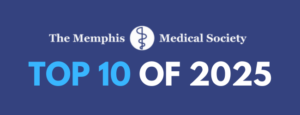Member Spotlight: Alicia Barnes, DO, MPH

“I chose to get into this work because early intervention is the key to lifelong well-being and mental health,” said board-certified child and adolescent psychiatrist and Memphis Medical Society member Alicia Barnes, DO, MPH.
“A lot happens during early childhood and being able to intervene when a child is distressed or be there when a family experiences stress has profound impact on children.”
In her new role as Urban Child Institute Endowed Chair of Excellence for Child and Adolescent Psychiatry at the University of Tennessee Health Science Center (UTHSC), a position she stepped into this summer, her work will focus on improving mental health and wellness outcomes for young people and their families. Because of UTHSC’s stature as the primary education and research institute of healthcare professionals for Tennessee, the impact of the division will not only improve children’s mental health in Memphis but around the state and country.
“It’s about interventions that go beyond treating one child at a time,” she said. “We’re developing systems and programs that are proactively treating children and adolescents through healthy communities and healthy cities. It isn’t this child in this family but building out ecosystems of mental health and well-being. With children, it definitely takes a village.”
As the inaugural UCI Endowed Chair and serving as the Director of the Division of Child and Adolescent Psychiatry at UTHSC, Dr. Barnes oversees six child and adolescent psychiatrists and five trainees doing their fellowship in the field. She also holds the title Chief of Psychiatry at LeBonheur Children’s Hospital. Together, developing initiatives in clinical care and research focused on early childhood mental illness and its risk factors like childhood trauma, poverty, exposure to violence, and neglect- all significant social determinants of health with profound potential to cause generational trauma in families.
Because of our city’s cohesive and interwoven medical community, Dr. Barnes and her team have access to unique partnership opportunities, a Memphis-specific perk that is part of the reason she chose to bring her expertise to the city.
“The work that’s gone on in Memphis addressing trauma in childhood is a big part of why I came. The Tennessee Department of Mental Health and Substance had an initiative called Building Strong Brains, and what I learned from it was that the institutions and people serving children here all spoke a similar language about early childhood trauma,” she said. “That isn’t the case everywhere.”
“Starting with that common language, it makes it very easy to then move forward to ask ‘What are the intergenerational traumas? How do we build systems to address them?’ We can’t just treat a child and send them back to a home that continues to have public safety challenges.”
Another advantage to doing her work in Memphis is the abundance of opportunities to work with partners outside of the field of medicine. She cites the collaborative relationship between Memphis’ government, researchers, philanthropists, and medical professionals as a major driver in the campaign for childhood and adolescent mental health.
“I knew in high school I wanted to go into child psychiatry, and went to undergrad in Illinois, followed by research training in Missouri,” she said, tracing her path here. “I did my medical school training in Philadelphia and then went on to New York, and then to St Louis. Now I’m here. Memphis is way ahead in terms of nonprofits, faith-based organizations, state and local government programs, community activists, and the medical community sharing a common language and understanding what needs to be addressed.”
Although our city’s shared language offers a strong foundation, significant work remains to ensure children and adolescents in need of this care are effectively reached.
“We find ourselves in a children’s mental health crisis as declared by the American Psychiatric Association, American Academy of Pediatrics, American Academy of Child and Adolescent Psychiatry, and Children’s Hospital Association,” she said.
“A key part of that is workforce need- we need more child and adolescent psychiatrists and access to community-based programs. The cost of psychiatric services can be much lower with collaborative systems.” she said. “More of us would be able to intervene at an earlier stage of distress and impact more children. When we partner with agencies in our communities, identify early warning signs, and connect children with services, we’re supporting more families, and it makes a big difference.”
Meeting the mental health needs of children and adolescents is an intrinsic societal responsibility, and the future of the specialty and research is critical. If you are interested in partnering with the division of Child and Adolescent Psychiatry, please reach out to Dr. Alicia Barnes and help expand our community and professional mandate to support and foster children’s mental health and well-being.
Dr. Barnes is also the president of the Tennessee Society of Child and Adolescent Psychiatry and has served on the executive council of the American Academy of Child and Adolescent Psychiatry.





